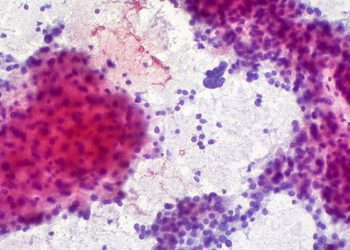Low-strength evidence for hepatocellular carcinoma screening in liver disease
1. This systematic review identified very-low strength evidence pertaining to the benefits of screening for hepatocellular carcinoma (HCC) among patients with chronic liver disease.
Evidence Rating Level: 1 (Excellent)
Study Rundown: The incidence and mortality of HCC has been increasing, especially among patients with chronic liver disease. However, the utility of screening to detect early stage disease on improving mortality is largely unknown. Therefore, the authors of this study performed a systematic review to determine the efficacy of HCC screening in patients with chronic liver disease. The most common methods of screening were periodic ultrasonography and/or serum alpha-fetoprotein (AFP) testing. Generally, there were no harms from screening, as the major adverse effect described was needle-track seeding, which is no longer applicable to modern practices as liver biopsy is no longer used routinely in the diagnosis of HCC. From an analysis of the pooled studies, screening was successful at detecting early stage disease. However, in a large number of studies, its impact on reducing mortality was not statistically significant. Additionally, two trials also showed no improvement with shorter screening intervals. A major limitation of this analysis is the inherent complexity of HCC, with highly variable growth rates and mortality, as well as treatment by resection or transplant, which can often bias studies towards those with less aggressive disease. Overall, it is unclear whether routine screening for HCC has a mortality benefit, and these is clear need for further research.
Click to read the study, published today in the Annals of Internal Medicine
Click to read an accompanying editorial in the Annals of Internal Medicine
Relevant Reading: Randomized controlled trial of screening for hepatocellular carcinoma
In-Depth [systematic review]: 22 studies, including two randomized controlled trials (RCTs), were included for analysis. In one of the RCTs, which had a number of methodological weaknesses, HCC-related death was decreased in the screening group, with a rate ratio of 0.63 (CI=0.41-0.98). But in the other RCT, the rates of HCC-related deaths were nearly identical (p=0.86) between screened and unscreened groups. Among the observational studies, many suffered from lead-time bias, where it was unclear whether any increase in survival was attributed to the early detection of HCC by screening, although some of these studies did correct for this by using statistical estimation of tumor growth. Together, a complete meta-analysis of the 36 trials had a combined odds ratio (OR) of 1.9 (CI, 1.67 to 2.17) for 3 year survival. However, the methodology of most of the studies included had substantial limitations. Together, these data neither support nor refute the current recommendations for HCC screening.
More from this author:Household firearm accessibility increases risk of suicide and homicideTranscatheter aortic valve replacement provides only minor benefit to quality of lifeNo difference in statin-related myalgias compared to placebo in single-patient trialsHIV infection may increase rate of HCV-related hepatic decompensationLow-dose aspirin may reduce risk of preeclampsia
Image: PD
©2012-2014 2minutemedicine.com. All rights reserved. No works may be reproduced without expressed written consent from 2minutemedicine.com. Disclaimer: We present factual information directly from peer reviewed medical journals. No post should be construed as medical advice and is not intended as such by the authors, editors, staff or by 2minutemedicine.com. PLEASE SEE A HEALTHCARE PROVIDER IN YOUR AREA IF YOU SEEK MEDICAL ADVICE OF ANY SORT.








